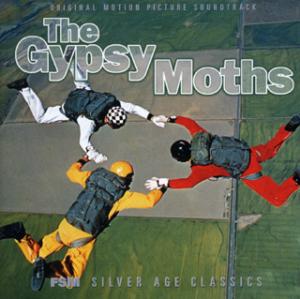************************************************************** RECOMMENDED December 2002 **************************************************************
Elmer BERNSTEIN
The Gypsy Moths
(additional music by Shorty Rogers)
FILM SCORE MONTHLY Vol. 5 No. 12 [61:08]
Available from Film Score Monthly, 8503 Washington Boulevard, Culver City, CA90232; Tel: 1-888-345-6335; overseas: 310-253-9595; fax: 310-253-9588; e-mail: Info@filmscoremonthly.com

The Gypsy Moths (1969) is an overlooked drama made by John Frankenheimer, better known for The Manchurian Candidate, Seven Days in May, The Train, Grand Prix, Black Sunday, Ronin and other hard-hitting, technically accomplished action-adventure-dramas. It was the second Frankenheimer picture scored by Elmer Bernstein, though the first on which they actually worked together; the director already having left The Birdman of Alcatraz by the time the composer arrived. Both films happened to star Burt Lancaster, though they couldn't have been more different in setting, from the cramped confines of a notorious prison to the wide open vistas of a skydiving drama.
As was common in the 1960's, Bernstein's score is quite brief and runs to 11 tracks totalling 27 minutes. Even so, several of these were not used, or truncated in the released film, making this the first time they have been heard by the public. In order to focus upon the more intimate drama rather than the technically audacious action the more adventurous, barnstorming cues were not used. The result is a largely low key score, lyrical, introspective and with a melancholy Americana main theme; a portrait of impossible love found too late (the film reunited Lancaster with Deborah Kerr, the famous lovers in From Here to Eternity) against the beautiful landscapes of the American Midwest. Ghostly flute effects and gentle tuned percussion create delicate, unsettled atmospheres while even the most romantic passages have the restrained, repressed quality of sombre chamber music.
The main title is suitably dignified and tuneful (if recalling in part the Mexican village theme from The Magnificent Seven), while a barnstorming showpiece sequence such as "Big Stunt" is filled with imaginative effects and quite brilliantly orchestrated, bringing emotional resonance to what is more than purely action spectacle. There is a near Wagnarian intensity to the propulsive finale "Malcolm's Feat/Going On" coupled with a wild marching band mood which brings the score to a memorable end.
After the score proper comes 17 minutes and 10 cues worth of music written as source material for the film's nightclub scenes. The five are jazzy numbers recorded with a 17 piece big band, five recorded with a 9 member funk line-up. These were the cues used in the film and were written by Shorty Rogers. No one is sure who wrote the unused jazz cues. Bernstein does not remember and Rogers died in 1994. They may be by either composer, or by Bernstein with Rogers arranging. Either way, they are fun and thoroughly enjoyable.
Next comes seven "March" source cues, marches and waltzes heard over the PA system during the titular heroes' airshows. These were composed by Bernstein and performed by a 35 piece band. "Soaring March" is a particularly jolly piece which could easily have become a brass band favourite if extended beyond its 1.28 playing time.
Finally there is the edited version of the "Main Title" as used in the film. This completes an admirably comprehensive and authoritative issue of an excellent score. Being a Film Score Monthly release the packaging and presentation is of a high standard and the stereo sound is excellent. An essential purchase for Bernstein fans and a worthy addition to any film music collection.
Gary S. Dalkin

Return to Index